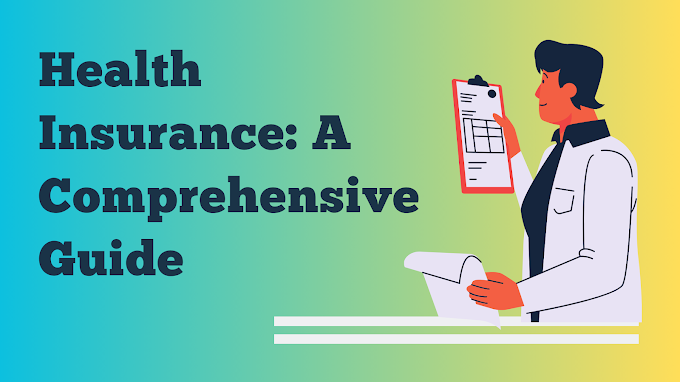Introduction
Health insurance, a cornerstone of modern life, plays a pivotal role in safeguarding our well-being and financial security. In this extensive guide, we will delve deep into the intricacies of health insurance, its increasing relevance in today's dynamic world, critical factors to weigh when purchasing a policy, tailoring coverage to individual needs, options for acquiring health insurance, and a resounding conclusion emphasizing its paramount importance.
What is Health Insurance?
Health insurance is a contractual agreement between individuals and insurance companies, primarily designed to provide financial protection against medical expenses. By paying regular premiums, policyholders secure coverage for a portion or the entirety of their healthcare costs, encompassing medical treatment, hospitalization, surgeries, prescription medications, and preventative healthcare measures.
The Need for Health Insurance in Today's Life
The evolving landscape of contemporary life underscores the compelling need for health insurance:
a. Skyrocketing Healthcare Costs: The burgeoning cost of medical services has made health insurance essential. Without it, individuals risk depleting their savings to meet unforeseen medical bills.
b. Unpredictable Health Emergencies: In an unpredictable world, illnesses and accidents can strike without warning. Health insurance provides peace of mind and financial stability when confronting these crises.
c. Access to Quality Healthcare: Health insurance often grants access to a wider spectrum of medical services and specialists, ensuring top-tier care.
d. Legal Mandates: In many regions, health insurance is obligatory. Failing to comply may result in fines or restricted access to healthcare.
Key Considerations When Buying Health Insurance
The process of purchasing health insurance demands a careful evaluation of several pivotal factors:
a. Coverage Options: Familiarize yourself with various health insurance plans, such as individual, family, group, or government-sponsored plans, and choose one that aligns with your needs.
b. Premiums and Deductibles: Assess your financial capacity to pay premiums and meet deductibles. A balance must be struck between affordability and coverage.
c. Healthcare Provider Network: Verify if your preferred doctors, hospitals, and clinics are included in the insurance provider's network.
d. Coverage Limits: Ensure that the policy extends sufficient coverage for anticipated medical services, minimizing out-of-pocket expenses.
e. Additional Benefits: Explore policies offering supplementary benefits such as maternity coverage, dental care, and mental health services, depending on your requirements.
f. Pre-existing Conditions: Understand how pre-existing conditions are handled, including any waiting periods or exclusions.
Determining the Appropriate Coverage
Tailoring your health insurance coverage hinges on numerous factors:
a. Personal Health Needs: Gauge your current health status, ongoing medical conditions, and potential future healthcare requirements.
b. Budgetary Considerations: Balance the extent of coverage with your financial capabilities, ensuring that premium payments are manageable.
c. Risk Tolerance: Contemplate your willingness to bear personal financial risk versus transferring it to the insurance company.
d. Family Dynamics: If you have dependents, factor in their healthcare needs while assessing the extent of coverage.
Where to Buy Health Insurance
Health insurance can be procured through diverse channels:
a. Employers: Many employers offer group health insurance plans as part of their employee benefits packages.
b. Insurance Agents and Brokers: Consulting insurance agents or brokers provide access to expert guidance and a range of policies from multiple providers.
c. Online Marketplaces: In numerous regions, online platforms facilitate comparisons and purchases of health insurance plans from various providers.
d. Government Programs: Government-sponsored programs cater to eligible individuals, offering health insurance options in specific regions.
Conclusion
In summation, health insurance stands as a cornerstone of modern life, safeguarding financial stability and well-being in the face of unforeseen medical expenses. Beyond financial protection, it affords access to superior healthcare services, alleviates the strain of rising medical costs, and prepares individuals for health emergencies. When procuring health insurance, meticulous consideration of individual needs, budget constraints, and available options is paramount. By securing the most suitable health insurance coverage, individuals are actively securing a healthier, more financially secure future. The importance of health insurance cannot be overstated, making it a cornerstone of modern financial planning and personal well-being.









0 Comments